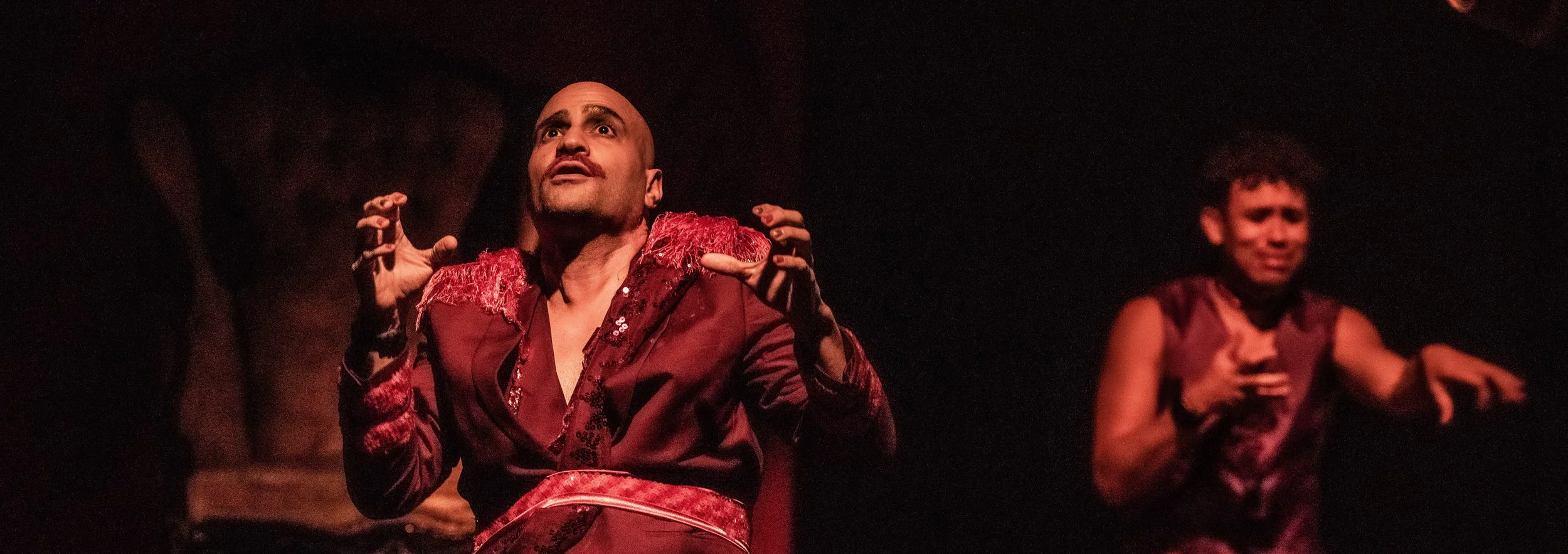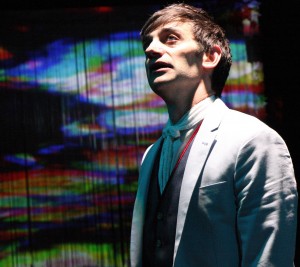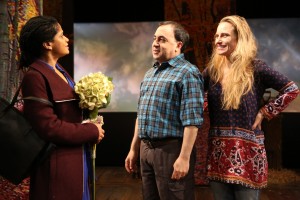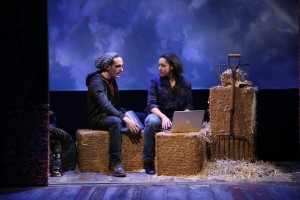Echoing through the halls and into the New Ohio Theatre’s performance space is My Onliness, a daring new experimental work co-produced by the collective One-Eighth Theater, the New Ohio Theatre, and IRT Theater. Written by New Ohio’s artistic director, Robert Lyons, My Onliness takes elements inspired by Polish dramatist Stanislaw Ignacy Witkiewicz and transforms them into what One-Eighth declares as the New Absurd. And wonderfully absurd it is.
'Hommage' to an Idiot
Idiot, now at the lovely main space at HERE, is a feast of multimedia effects. With crisscrossed Persian carpets forming aisles that divide the audience into four quarters, video panels above, and heated Oriental rhythms in the background, the story unfolds. How to capture the innocence and depths of the epileptic Prince Lev Myshkin, portrayed by Daniel Kublick, in this theatrical version of and hommage to the great Dostoevsky novel? With a script that focuses on the tempestuous relations of four key characters of the Dostoevsky work; with philosophical riffs; with inventive use of video, light, and sound; with song, dance, gesture and interaction with the audience! This is immersive theater, a specialty at SoHo’s HERE, an award-winning theater organization devoted to the support of new work that cuts across artistic disciplines. Eve Ensler’s The Vagina Monologues was developed at HERE.
If romantic triangles usually involve a triad, the triangle in this case has four corners: the lascivious Parfyon Rogozhin is obsessed by Nastasya Filippovna. Her hand in marriage, however, is also sought by the Prince who is, at the very same time, in love with the vivacious Aglaya Epanchin. The central conflict of the play, then, concerns the Prince’s love for both women.
The fallen, dissolute, but proud Nastasya Filippovna, fetchingly portrayed by Purva Bedi, disdains money (at one point she throws 100,000 rubles of Rogozhin’s money into a fire) and sees through the lies of others no less than the mind-reading Prince himself, who loves her “out of pity.” Lauren Cipoletti plays Aglaya. Also loved by the gentle Prince, and a beauty of good family standing, Aglaya shares much with him, including a great love of children. The blue-eyed, soulful and energetic Prince Myshkin, beautifully performed by Daniel Kublick, is the “idiot” of the title.
Rogozhin is played with verve and flourish by Merlin Whitehawk. The audience is treated to extremes of passion of the most brutal and delicate varieties; a motif of execution to emphasize the underlying question of life, its purpose and the experience of it; as well as the stormy relations among a virgin-harlot dyad (the female characters), a lecherous drunk, and an invalid Prince who is spiritual and hardly of this world.
This is the third partnering of Robert Lyons (text) and Kristin Marting (director and choreographer) in the adaptation of a work by Dostoevsky. And theirs is a rollicking and “immersive” production, to say the least. The point of immersive theater is to move past the limits of merely “watching” a staged production in order to create an experience that is more active, richer, and, presumably, deeper by “immersing” the audience in multiple theatrical effects. Always, the question must finally be asked, what exactly was accomplished by all of these theatrical goings-on?
There were arresting moments in this production. On several occasions, the sound of the Prince’s speech is engineered so that his words are somewhat muffled and have the distant sound of an echo, brilliantly suggesting the interiority of his spoken thoughts. At another point, the Prince is deeply moving as he wanders among the audience, accosts individual audience members and soliloquizes on the subject of human love, bringing some in his audience to tears.
But, for the most part, inventive use of video, gesture and dance, the dramatic story and interludes of deeper rumination do not, finally, cohere to immerse us in anything more than that spectacle itself. We are entertained but, finally, not enlarged in the course of this production.
It is unfair to require the depth of spiritual exploration and of character that is the greatness of the large and rambling Dostoevsky novel. This is another work entirely, in another genre entirely. The achievement of Dostoevsky cannot be condensed into a mere 75 minutes. But it is not unfair to ask that the heart and soul be moved in the course of those 75 minutes and, given the extremes of human feeling and experience brought into view, moved deeply. That, one would hope, is the real goal of the best work in experimental immersive theater.
Idiot plays through May 21 at HERE Arts Center (145 Sixth Ave.; entrance on Dominick Street). Performances are at 8:30 p.m. Tuesday through Sunday. Tickets are $25 and can be purchased at www.here.org or by calling (212) 352-3101 or at the HERE Box Office (5 p.m. until curtain on show days).
Fifty Shades of Activism
In Robert Lyons’ Death of the Liberal Class, directed by Jerry Heymann at the New Ohio Theatre, Nick, played with a self-deprecating aplomb by Steven Rattazzi, is a balding, pot-bellied academic who has written a book called "Robo Corp" that has garnered him great success after years of being an adjunct professor and a freelance journalist. However, after a “nervous breakdown” in which he rejects the ideas he has written about in the book—that robots will take over the world and that they are “standing on the precipice of the darkest period in history”—he has retreated to a farmhouse in Canada owned by his wife’s family.
His teenage daughter Andrea, played with a convincing mixture of indifference and righteousness by Jeanette Dilone, however, has dropped out of high school and followed him there. She has swallowed her father’s previous convictions hook, line and sinker, and has decided to pursue her own brand of activism, “hacktivism.” She is joined by the unassuming yet handsome Even, played by Justin Colon (who appears to have a magnificent singing voice revealed in one small snippet in the play) whom she has met online. The computer is the perfect tool for activism. Where it was once dangerous and possible to suffer bodily harm—think Kent State University in 1970 when four were killed and nine wounded in a melee between protesters and National Guard—computers have removed the physical component of activism and provided the safety of anonymity. Even and Andrea quietly, heads together, plan to take down the Robot Economy that her father has written about. The sexual tension is palpable even with their eyes glued to their respective keyboards.
Meanwhile, everyone is mad at Nick. He’s been sleeping with Maggie, the dewy skinned and wholesomely pretty Olivia Horton, who lives on the farm next door with her husband, and also with Daphne, his wife, when she comes to visit. Maggie’s husband beats her for sleeping with Nick and Daphne chides him for leaving New York City.
Although there is still sexual chemistry between them, Melissa Murray as Daphne captures the understated disdain that New Yorkers have for those who leave. After all, who, in their right mind, would leave an Upper West Side apartment in New York City? She may as well come out and say it: he’s a loser! But, somehow, living on the farm, in the middle of Canada has made Nick feel peaceful, and dare we say it, happy. In the opening scene, Nick’s daughter notes how happy he seems. When he retorts “I’m not allowed to be happy?,” she nearly chokes with disgust, “Not this happy!”
Nobody wants Nick to change, especially his daughter. Yet, he no longer believes in the chaotic world he wrote about in his book nor does he want to have anything to do with it. His daughter decides to carry out her own grassroots activism, and hacks into Maggie’s account. Comic relief comes unexpectedly in an exchange between Nick, his daughter, and Constable La Fontaine, a Canadian Mountie who works in the cyber division, played with wonderful restraint by the mustachioed Arthur Aulisi. When the Constable arrives at the farmhouse to investigate the hacking, they deny it. Although the Constable remains beautifully polite, it appears he knows better. It’s a moment filled with tension and irony.
Although we usually think of men as being better hackers, Andrea is actually the gifted hacker who plans to infect Wall Street computers with a virus that will bring them crashing down. Nick pleads with her, and asks her to see how it will affect the little people, but she is so full of her own—or rather Nick’s—ideological idealism that she runs off with Even to carry out the plan.
When Nick’s wife realizes he isn’t coming back to the city with her, she leaves and gives him an eviction notice from the farmhouse. In the beginning of the play, you wonder what Nick’s appeal is: he’s a middle-aged guy with thinning hair and a thickening middle who’s sleeping with two beautiful women. But then we see that it’s his underlying sensuality that makes him attractive. After he rejects his own lofty “liberal” ideas about the Robot Economy, he actually becomes more attuned to the world of living through the senses. At one point, his daughter comes to him, computer attached to her arm like an extra appendage, complaining she can’t get access. He gently says “access these trees… access the sky.”
Robert Lyons’ play asserts a very important message in this age of technology: that it can be both useful and destructive, but what it’s not, is sensual. Nick may be the underdog here, but in the end, he’s the one who is the true activist: being in tune with the senses is more likely to save humanity than anything else. The rest of the world around him needs a little more time to get there.
Death of the Liberal Class, written by Robert Lyons and directed by Jerry Heymann, runs through Feb. 13 at the New Ohio Theater (154 Christopher St., #1E between Greenwich and Washington Sts.) in Manhattan. Performances are Wednesday–Thursday at 7 p.m., Friday–Saturday at 8 p.m. and Sunday at 5 p.m. Tickets are $18 and can be purchased by calling 1-888-596-1027 or visiting http://www.NewOhioTheatre.org.











